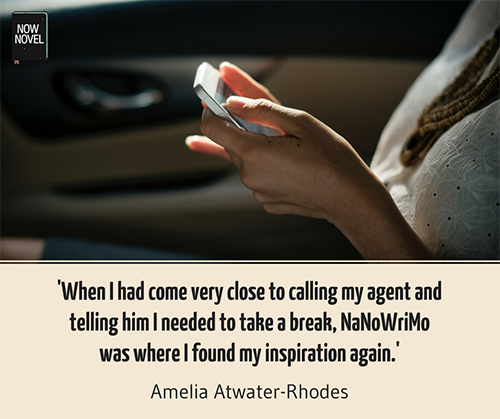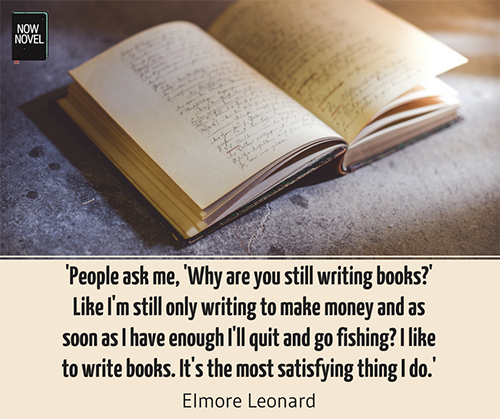Are you participating in NaNoWriMo this year? November’s annual write-a-thon sees hundreds of thousands of aspiring writers attempt to write and finish their novels. If you are determined to be one of the few aspiring writers who succeed, it’s important to find consistent sources of motivation. Here are 7 ways to get and stay motivated for NaNoWrimo ( the methods apply to staying motivated to finish your book any time of year):
1. Create a schedule that gives realistic, attainable writing goals
As the saying goes, ‘a dream without a plan is just a wish.’ Becoming a novelist requires not only creativity but consistent work. It’s much easier to be consistent about writing your book when you have a realistic schedule in place.
Work out what your average daily word count needs to be
Consider the average length of a book in your genre:
Sci-fi novels tend to run longer than, for example, YA books. According to Chuck Sambuchino at Writer’s Digest, a decent length for a sci-fi novel might be 100 000 words while a YA novel may be as short as 55 000 words. Once you have an idea of length, divide this by 30 to find the average number of words you need to write per day in November (if starting your book from scratch). Remember to be realistic: If you intend to write a 100 000 word sci-fi space opera, you’ll need to write an average of 3333 words per day to finish in the time-frame. If you have a 9 to 5 job this might be impossible. Aim instead for a 60 000 word book. This will leave 2000 words per day and you can always expand on your first draft after the end of NaNoWriMo.
Break down your daily writing schedule into smaller parts
Even 2000 words daily is a large chunk of writing, and this has the potential to hamper your writing motivation. To avoid this, schedule your writing sessions and make sure of the following:
- Are you taking breaks for smaller milestones? Every 900 words, for example, get up and make yourself a warm beverage or take a brief walk outside.
- Do you have a clear idea of your average words per minute? Say, for example, that you write 30 words per minute, in 30 minutes of solid writing you will have 900 words. Breaking up your time this way makes writing a novel within one month much less daunting.
The idea of a schedule is great in practice for staying motivated, but what if you get stuck? The important thing with NaNoWriMo is to keep writing no matter what. To maximize your speed and efficiency, plan at a micro level, not only a macro one. At the start of each writing session, write down a brief synopsis of what you want to achieve. For example:
Target: 900 words
Scene: Gary has a mid-life crisis and buys a motorcycle.
Purpose: To show that Gary can be impulsive sometimes which will foreshadow and explain his actions when he quits his job and goes on an epic road trip.
Of course you might prefer not to outline beforehand and see where the scene and characters take you. But even with a goal – not only for word count but for each writing session – you can exercise freedom. What’s more, it’ll make it easier to stay motivated and focused and draft your novel faster.
2. Eliminate distractions that diminish your writing focus
Often what we see as lack of motivation is equal parts lack of focus. You sit down to write but end up doing other things (checking Facebook, reading posts on websites like Buzzfeed and Mashable, and so on). If necessary, install an internet browser extension for writers that blocks the distraction-centered websites you visit most frequently.
You can group distractions into two categories: Feel-good and must-do.
The ‘must-do’ distractions are those duties and obligations that might distract you from your writing but are unavoidable. If you have children who need your attention and time, schedule your writing time for when they are asleep. Try to start seeing the must-do breaks from writing as rewards too. That way it will lessen the sense of frustration that comes with distraction – a potent motivation killer.
If you need to do household chores, for example, let the mindlessness of the task provide you with a chance to replenish mental energy after you’ve been focusing hard. This is better than trying to use this time to plot or plan scenes in your head, as true off time will let you resume your work feeling more refreshed.
To reduce writing distractions, here are some simple do’s and don’ts:
Do:
- Make a list of your biggest distractions and how you will reduce each one
- Follow through on your list
- Use external sources of reinforcement if your self-control regarding distraction wanes (browser extensions for blocking distracting websites; friends or family who promise to refuse to see you until you reach your target)
Don’t:
- Try to eliminate all the activities and pursuits you love – it’s important to balance the work side of writing with other forms of play
- Let the process of trying to reduce distractions become a procrastination tool in itself (there’s only so many times you can change writing rooms)

3. Set up a system of writing rewards
Part of what makes motivation difficult for aspiring writers is that the reward of finishing a book can seem very distant and intangible.
Rewarding yourself for reaching milestones will keep you focused and motivated. Is there something you’ve been saving up for and have been meaning to buy? Tie obtaining what you desire to reaching your writing goal, so that you increase the sense of achievement.
Rewards don’t have to be material, and doing activities you enjoy is actually one of the best rewards. Schedule a night out with friends, watch a movie you’ve been itching to see, or indulge in an activity that brings you joy and calm, be it yoga or an outdoor hike. The key is moderation and delayed gratification. Stretch out the things you love and enjoy them as you become a novelist, word by word and reward by reward.
Author and Now Novel writing coach Nerine Dorman also emphasises how important it is to create these little rewards, saying part of the reason she lost her mojo was because she didn’t do so.
One of the joys of NaNoWriMo is that it has its own in-built reward system too. For every milestone you reach, you can display a badge on your profile that shows that you are motivated and committed to finishing your book and becoming an author.
4. Find focus and cheering supporters in a writing group
Sometimes it’s best to get an encouraging word or a suggestion for overcoming an obstacle in your writing from a small writing group. Many famous writers have found the motivation and perseverance to write amazing books through close association with other writers. C.S. Lewis (who wrote the Narnia fantasy series) and J.R. Tolkien (author of The Lord of the Rings) were in a writing group together called The Inklings at the University of Oxford.
When it’s time for a break, join other writers and read any extracts they’ve shared or simply chat and enjoy some well-earned social time.
5. Post motivating pictures and words around your writing space
Gather inspirational or motivational quotes and images that make you feel emotionally driven to finish your book.
Write a list of 5 positive benefits of writing a book. (E.g. ‘I’ll discover important things about myself’ or ‘I’ll have the satisfication of finishing what I’ve started’). Post them prominently in your writing space to remind you why you’re participating in NaNoWriMo in the first place. This will help you keep your eyes on the finish line.
6. Get a writing coach
One of the biggest challenges to staying motivated is the fact that you have to find the will to finish telling your story yourself. Even so, a gentle external push coupled with guidance for overcoming obstacles gives extra motivation. A writing coach provides accountability that makes you answerable to someone other than yourself. Your coach can also give practical advice for increasing your productivity and eliminating distractions.

7. Anticipate the urge to quit and decide in advance how you’ll conquer it
What do we do when we lose all motivation? We give up. It’s all too easy to quit your writing dream, but you can safeguard yourself from quitting halfway through NaNoWriMo from the start. What will your plan of action be if you start to feel like you’ll never finish your book? Remember to take the preliminary steps outlined so far:
- Break your novel writing into small, attainable unit goals
- Join with others who are doing the NaNoWriMo challenge for mutual support (and even healthy competition)
- Write down a list of the benefits you’ll enjoy if you persevere and finish
- Create a schedule and reward scheme for yourself that boosts your writing enjoyment
Know that there will be times that feel like harder work and less creative play,and have a plan for how you will make the less fun side of writing more enjoyable.
For example, if your characters are boring you, introduce a secondary character and create some passing conflict. Conflict can quicken your story’s pace and draw out important character attributes. Whenever you feel the urge to quit, leap in at a different scene, make a character do something unexpected, or find some other way to switch things up.
Feeling motivated yet? Get and stay motivated for NaNoWrimo and start and finish writing your novel.
Cover source image by Glenn Carstens-Peters


2 replies on “7 ways to stay motivated during NaNoWriMo”
I’m incredibly excited for this year’s NaNoWriMo, and you’ve shared some incredibly helpful tips!
I love the idea of breaking down the word count, and having something outlined for each chunk. I’m a planner for sure, and I find that when I don’t have something in mind to write, things get a bit too messy. So I will most definitely be using the trick you mentioned! Also, I love using Write or Die to make sure that I stay focused and don’t succumb to the lure of the Internet. Having that extra motivation really keeps me on task. I also find that the NaNo forums are an excellent place for support, and I’m looking forward to attending a few write-ins this year! Hopefully I’ll be able to build a lovely writing community, more so than I have in the past few years.
Thanks for the advice! Here’s to an amazing NaNoWriMo. <3
-Aneeqah @ The Writing Hustle
Hi Anneqah,
Thanks so much for the feedback, we love hearing from readers. I hope you have fantastic NaNoWriMo. Glad you found the tips useful. Join the NaNoWriMo writing group on Now Novel to connect with others who are taking part in the challenge if you’d like to share with a motivated writing community.
It’s a pleasure, happy writing!